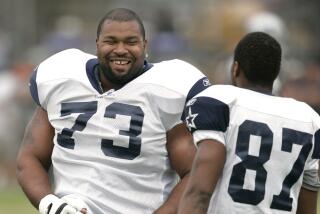Larry Evans dies at 78; five-time U.S. chess champion and writer
- Share via
Larry Evans was a rarity in competitive chess — a five-time U.S. champion who wrote widely about the game, including a book once considered the chess players’ bible.
A chess grandmaster, he also gained fame for helping Bobby Fischer train for, and win, the 1972 world chess championship.
Evans died Nov. 15 at a hospital in Reno from complications after a gall bladder operation, according to the U.S. Chess Federation, the governing body for the game. He was 78.
“There’s a void now in American chess,” said Anthony Saidy, an international chess master. “He is irreplaceable because of his vast literary output and his popularity with readers throughout the country.”
Without any formal training, Evans won his first U.S. championship in 1951, when he was 19, and won his second the following year. He had been schooled on 42nd Street in his native New York City, where he played for 10 cents an hour.
Three more national championships came in 1961-62, 1968 and 1980, the year he turned 48 and claimed the title in a three-way tie.
“For many people, my style was defined by pulling lost games out of the fire,” he wrote in 2000 in the South Florida Sun Sentinel.
Evans also had joked that he was the founder of “pawn-snatching anonymous,” a reference to “greedily grabbing material” in moves that he then had to defend, Saidy said.
Since about 1950, Evans had made his living from the game, mainly through his vast writings. He published more than 20 books, wrote a long-running syndicated newspaper column and for nearly 40 years penned a question-and-answer column for Chess Life magazine.
After Evans completely revised “Modern Chess Openings” in 1965, it was commonly referred to as “the bible” and became an important theoretical text that “set the standard for all future encyclopedic chess books,” Kevin Spraggett, a top Canadian chess player, wrote last week on his blog.
Chess aficionados have observed that the celebrated 1969 Fischer book, “My 60 Memorable Games,” would not have been possible without the help of Evans, who collaborated with the tempestuous Fischer and pushed him to finish it.
“Getting those details out of him was like pulling teeth — he didn’t want to give away his secrets,” Evans said in Newsweek when Fischer died in 2008. “I’d say, ‘Well, if he makes this move, then what do you do?’ I scribbled it all down and tried to be as faithful to his words as I could.”
Leading up to the 1972 world championship, Evans served as Fischer’s “second,” a chess term that means he helped train and prepare him for competition. But they had a falling-out before Fischer’s title match against Boris Spassky in Reykjavik, Iceland. Evans later said that they disagreed over the parameters of the trip that would last more than two months.
Fischer “imposed conditions that were unacceptable,” Evans told the World Chess Network in 2004. “Like I couldn’t write about his matches” or “take my wife with me.”
Larry Melvyn Evans was born March 22, 1932, to Harry Evans and the former Bella Shotl. His father and brothers taught him to play chess when he was 12, according to Chess.com.
At 15, he became the youngest player to win the championship staged by New York City’s noted Marshall Chess Club. Two years later, Evans tied for the U.S. junior chess championship.
In 1950, he won a gold medal in the Chess Olympiad in Dubrovnik, Yugoslavia, the first of eight biennial Olympiads he would compete in over the next 26 years. Evans also won a team gold in 1976.
He received a bachelor’s degree in 1954 from what is now City University of New York, and the World Chess Federation awarded him the title of grandmaster in 1957.
In 1968, he married moved to Reno, where he had another, far shorter career as a card-counting gambler before casinos banned him.
Evans tried to make each chess game “a work of art,” he told the Sun Sentinel in 1997.
More than once he had voiced the notion that “chess is a pocket of beauty in a noisy world.”
His survivors include his wife, artist Ingrid Evans, and two stepsons.
More to Read
Start your day right
Sign up for Essential California for the L.A. Times biggest news, features and recommendations in your inbox six days a week.
You may occasionally receive promotional content from the Los Angeles Times.








